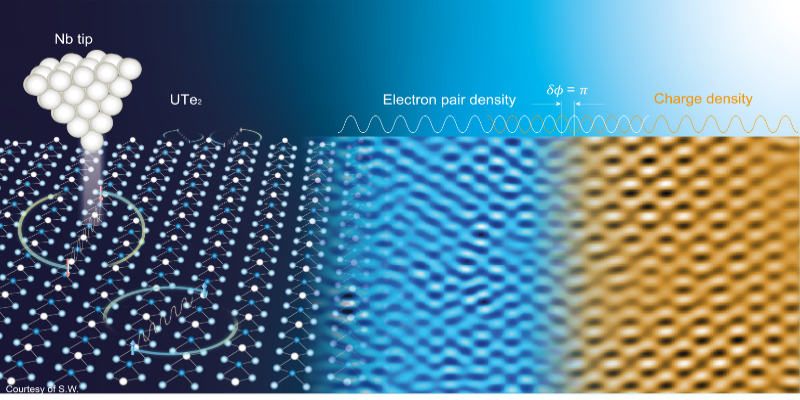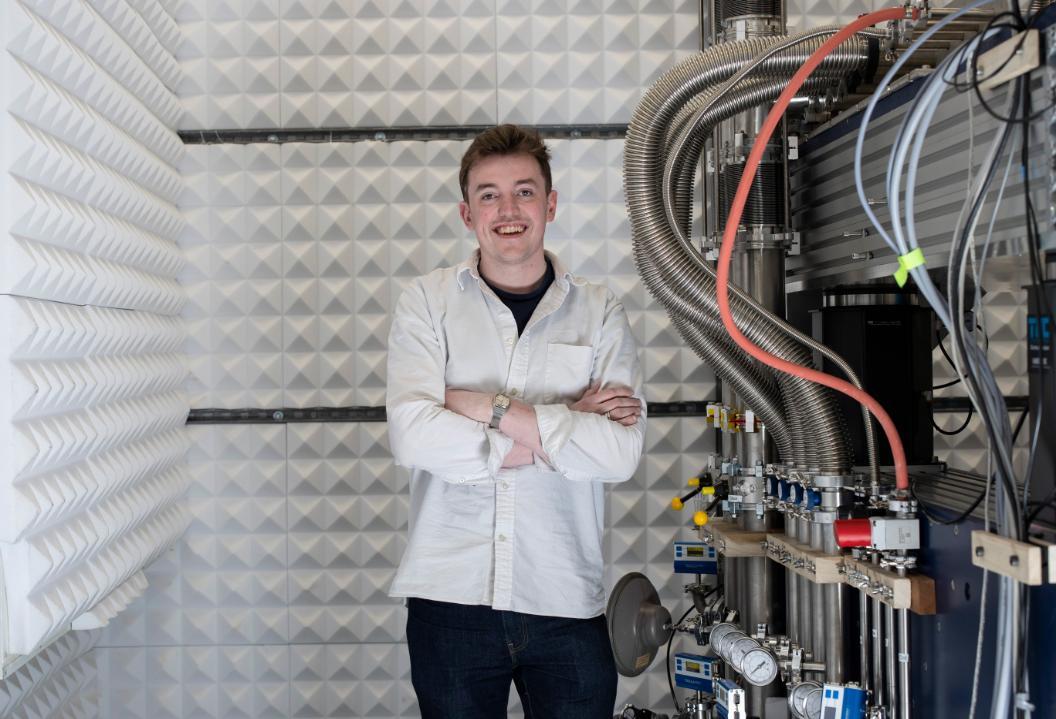In This Section
- Home
- Semester and Timetable Information
- Study Physics
- Our Research
- Our People
- Careers and Alumni
- Seminars, News and Events
- Outreach and School Resources
- About the School
- What is Physics
- The Crawford Observatory
- Frequently Asked Questions
- UCC Futures Quantum & Photonics
- Supports/EDI
Superconductor breakthrough for the future of quantum computing

Macroscopic Quantum Matter Research Group, School of Physics, UCC have new material on a Superconductor breakthrough that could be significant for the future of quantum computing.
This new superconductor may provide a solution to one of quantum computing’s greatest challenge. Using one of the world’s most powerful quantum microscopes, researchers have discovered a spatially modulating superconducting state in a new and unusual superconductor material uranium ditelluride (UTe2).
Joe Carroll (pictured below) who is under the supervision of world leading scientist Professor Séamus Davis made the breakthrough.

"Detection of a pair density wave state in UTe2" - Full article here.
This crucial characteristic of new superconductor material, Physicists have been searching for material like it for nearly 40 years!
Joe Carroll gives information on this finding as follows:
"Superconductors are amazing materials which have many strange and unusual properties. Most famously they allow electricity to flow with zero resistance. That is, if you pass a current through them they don’t start to heat up, in fact, they don’t dissipate any energy despite carrying a huge current. They can do this because instead of individual electrons moving through the metal we have pairs of electrons which bind together. These pairs of electrons together form macroscopic quantum mechanical fluid."
"What our team found was that some of the electron pairs form a new crystal structure embedded in this background fluid. These types of states were first discovered by our group in 2016 and are now called Electron Pair-Density Waves. These Pair Density Waves are a new form of superconducting matter the properties of which we are still discovering."
"What is particularly exciting for us and the wider community is that UTe2 appears to be a new type of superconductor. Physicists have been searching for a material like it for nearly 40 years. The pairs of electrons appear to have intrinsic angular momentum. If this is true, then what we have detected is the first Pair-Density Wave composed of these exotic pairs of electrons."
When asked about the practical implications of this work Mr. Carroll explained;
"There are indications that UTe2 is a special type of superconductor that could have huge consequences for quantum computing."
"Typical, classical, computers use bits to store and manipulate information. Quantum computers rely on quantum bits or qubits to do the same. The problem facing existing quantum computers is that each qubit must be in a superposition with two different energies - just as Schrödinger’s cat could be called both ‘dead’ and ‘alive’. This quantum state is very easily destroyed by collapsing into the lowest energy state – ‘dead’ - thereby cutting off any useful computation."
"This places huge limits on the application of quantum computers. However, since its discovery five years ago there has been a huge amount of research on UTe2 with evidence pointing to it being a superconductor which may be used as a basis for topological quantum computing. In such materials there is no limit on the lifetime of the qubit during computation opening up many new ways for more stable and useful quantum computers. In fact, Microsoft have already invested billions of dollars into topological quantum computing so this is a well-established theoretical science already." he said.
"What the community has been searching for is a relevant topological superconductor; UTe2 appears to be that."
"What we’ve discovered then provides another piece to the puzzle of UTe2. To make applications using materials like this we must understand their fundamental superconducting properties. All of modern science moves step by step. We are delighted to have contributed to the understanding of a material which could bring us closer to much more practical quantum computers."
- Superconductor breakthrough at UCC could be significant for future of quantum computing – The Irish Times
- https://www.ucc.ie/en/news/2023/ucc-research-breakthrough-could-be-significant-for-quantum-computing-future.html
Huge congratulations to Joe, Professor Davis and the Macroscopic Quantum Matter Research Group where this important discovery hopes for significant consequences for the future of quantum computing and is a great initiative for the upcoming launch of UCC Futures - Future of Quantum and Photonics research.
School of Physics
Scoil na Fisice
Contact us
Room 213 (Physics Office), 2nd floor, Kane Science Building, University College Cork, Ireland.,
